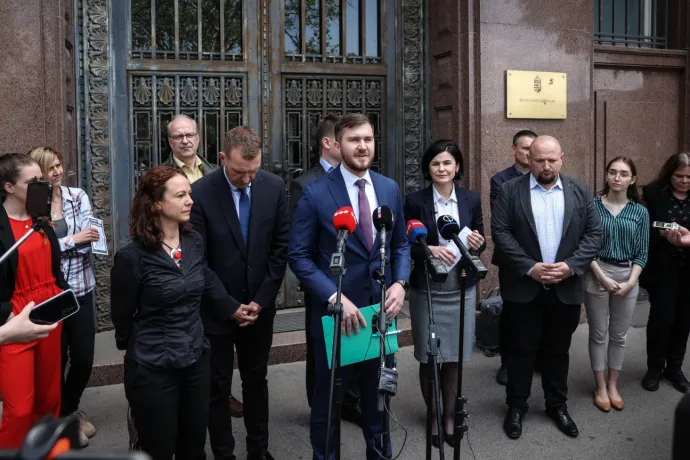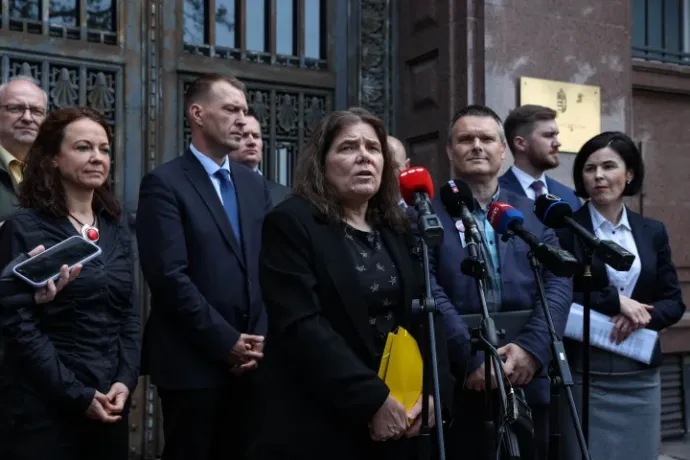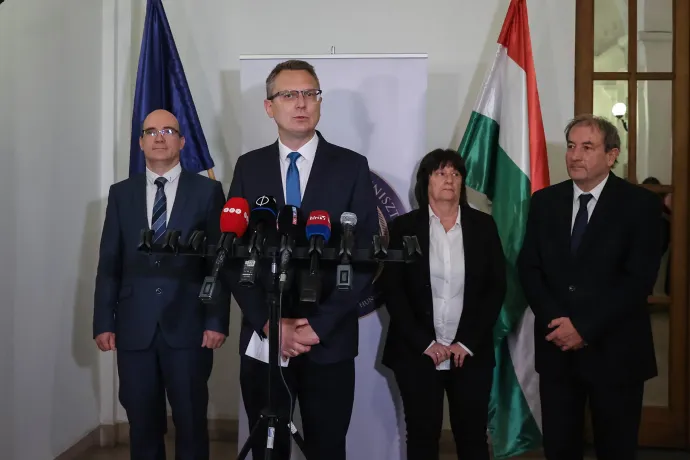Conciliation on education bill a political puppet show according to opposition leader

“This was not a professional meeting, but a political puppet show”,
Ferenc Gelencsér, president of Momentum said at a joint press conference of the parties and the teachers' trade unions after Wednesday's conciliation on the status law, which was convened by Interior Minister Sándor Pintér half an hour before the student protests last Friday.
According to the invitation, the opposition parties were allowed to bring one expert each to the meeting, which was attended by all opposition parties. The opposition representatives were accompanied to the meeting by one member each from the Teachers' Trade Union (PSZ), the Democratic Trade Union of Teachers (PDSZ), Tanítanék Mozgalom (I'd like to teach movement), the Civil Platform for Public Education (Civil Közoktatási Platform), the ADOM Student Movement and Egyesült Diákfront (United Student Front).
This was the first time that the teachers' unions had met in person with Sándor Pintér, who, as Minister of the Interior, is also responsible for education.
The professional organisations were not given a say in the discussions, and Sándor Pintér spoke only to representatives of the political parties. Gelencsér said that Wednesday's meeting showed that there was no openness in the interior minister to withdraw the much-criticised bill. At the press conference held after the meeting, Balázs Barkóczi, an MP of the Democratic Coalition (DK) , said that the status law, which has been dubbed "the revenge law", should not be the basis for negotiations. As professional organisations were not allowed to have a say in the conciliation, they are not willing to negotiate on the proposal either. Tímea Szabó, a representative of Párbeszéd (Dialogue), also said that the only issue they were willing to discuss with the minister was improving the situation of education.
Erzsébet Nagy, the representative of the union PDSZ, said that the interior minister responded to their comments with the government's usual slogans. Pintér promised that there would be another round of consultations with experts. Nagy said that they would be very curious about this, adding that they had no illusions following Wednesday's meeting. Only the representative of the National Faculty of Education (Nemzeti Pedagógus Kar) was heard, who proposed a reduction in the number of required lessons to be taught. Erzsébet Nagy said there could be a shift in this, but it could also be "just part of the game."

Pintér was also unimpressed that they had brought the signatures of the 27,000 protesters who demanded the withdrawal of the status law, and the statements of the nearly 5,000 teachers who committed to not taking up their jobs if the status law came into force,
she added. Gábor Gosztonyi, vice-president of PSZ, stressed that this was the first time they had met Sándor Pintér "in 3D, in person", but they had only been able to see him, as they were not given an opportunity to speak in the meeting.
Lili Mihalics of the United Students' Front said it was unprofessional or cynical for Pintér to talk about how the status law would be better for teachers and students. Olivér Pilz represented Tanítanék Mozgalom at the meeting. He said that they came to Wednesday's meeting to show how much social opposition there is to the status law.
Opposition parties had earlier called Wednesday's talks a charade and a sham. They went anyway because they want to make it clear to the government that they find the status law unacceptable and because they believe it is more uncomfortable for Fidesz if they don't boycott the meeting.
Interior Ministry: We have consulted everyone
Shortly after the opposition parties and unions, the Interior Ministry also held a press conference. The minister, Sándor Pintér was not present, but State Secretary Bence Rétvári was, although he was not available to answer questions from the press.

The State Secretary said that the government had consulted everyone it could on the status law – teachers' unions, parents' and students' organisations, political parties. Rétvári also said that the drafting of the status law was preceded by a long process of consultation, including a consultation on education, in which teachers and parents could express their views. There is one round of the consultation process left, during which the European Commission will be consulted.
According to Rétvári, there is a consensus on the need to increase teachers' salaries, which the government still plans to cover with EU funds.
Rétvári repeated the government's familiar narrative that the Gyurcsány-led left is working against the teachers' pay raise because they are blocking Hungary's access to EU funds in Brussels. Rétvári said there was no guarantee at Wednesday's meeting that left-wing politicians would in the future be working in the interest of the teachers in Brussels and not against them.
The State Secretary claimed that during the meeting they responded to all the proposals of the opposition parties. He said they expected them to bring textual proposals as well, but they did not receive any, although they had three months to prepare them. According to Rétvári, the opposition parties didn't come to the meeting with the intention to have a discussion, but to walk out. When it was brought up, he didn't respond to the argument that teachers' unions and student organizations said that they weren't given the chance to even speak up during the conciliation.
In the end, Rétvári spoke about the intertwining of the opposition parties and the professional organisations that came to the talks with them: in his opinion, the Wednesday talks showed the extent to which these organisations are serving the parties.
For more quick, accurate and impartial news from and about Hungary, subscribe to the Telex English newsletter!